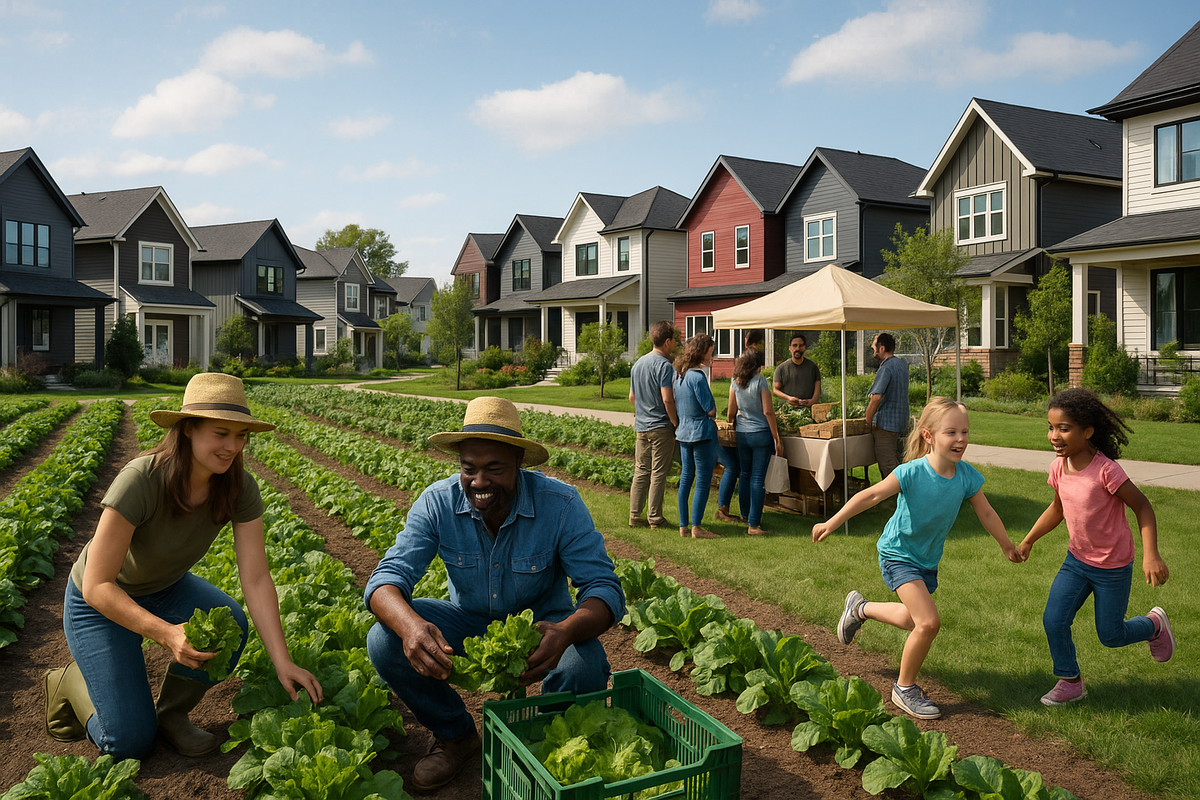
✍️ By Debbie Balfour | WBN News | August 25, 2025 | Click HERE for your FREE Subscription to WBN News and/or to be a Contributor.
Imagine living in a thriving neighborhood where fresh food is grown steps from your front porch, neighbors connect over farm-to-table dinners, and property values climb because of a built-in lifestyle that is both sustainable and community-driven. This isn’t a dream. It’s the rise of agrihoods, one of the most compelling investment strategies in today’s real estate market.
An agrihood is a residential community built around a working farm or community garden. Instead of the typical golf course or country club model, agrihoods use agriculture as the centerpiece. Residents often enjoy fresh produce, wellness-focused amenities, and a sense of purpose-driven living. With demand for healthier, greener lifestyles skyrocketing, investors are taking notice.
For developers and buyers alike, agrihoods represent more than a housing trend; they are a wealth-building opportunity. Land is often less expensive in rural or semi-rural areas, and once developed, these communities command a premium because they offer something unique: connection to land and lifestyle. Families, retirees, and eco-conscious millennials are driving demand, making resale values attractive and rental opportunities steady.
From an investment standpoint, agrihoods provide multiple income streams. Community-supported agriculture (CSA) programs can generate revenue from residents and locals. On-site farmers’ markets, event spaces, and educational workshops add profitability while strengthening community engagement. And unlike many developments, agrihoods often qualify for sustainability grants or tax incentives, reducing upfront costs for developers and investors.
Real-World Canadian Examples Leading the Way
While agrihoods have been widely embraced in the U.S., Canada is catching up quickly with several notable projects:
- Creekside Mills at Cultus Lake, BC – Recognized as British Columbia’s first agrihood, this 129-home community sits on 79 acres of farmland. Residents enjoy berry fields, vineyards, lavender meadows, and community gardens managed by a full-time farmer. It’s a proven example of how agriculture can be woven into a thriving residential development.
- Southlands, Tsawwassen (Greater Vancouver) – This ambitious project is designed around a 325-acre market farm, surrounded by 950 homes. The scale makes it one of the most significant agrihood-style developments in Canada, blending suburban living with food security and sustainability.
- Yarrow Ecovillage, Chilliwack, BC – Although not officially branded as an agrihood, this 20-acre organic farm and cohousing community has been operating for over two decades. It combines residential living, agriculture, and commercial amenities, offering a strong model for intentional eco-living.
- Kinsland, Ontario – A farm-forward village community where agriculture is the heart of daily life. Experienced farmers lead residents in sustainable growing practices, and the design emphasizes connection, food security, and education.
These communities prove that agrihoods are more than a passing trend—they’re a viable investment and lifestyle strategy that works right here in Canada.
The Future of Agrihood Investing
The long-term potential is significant. As urban sprawl continues, people are seeking healthier alternatives to crowded cities. Agrihoods deliver what today’s buyers want: wellness, food security, and connection. For investors, this means reduced vacancy rates, stable appreciation, and a future-proof model that aligns with global sustainability trends.
The smartest investors are not asking if agrihoods will grow—they’re asking how quickly they can secure their stake in this movement. Real estate isn’t just about land anymore; it’s about lifestyle. Agrihoods offer the chance to invest in both.
Debbie Balfour | Real Estate Investing Success Coach + Podcast Host
📍 Website: www.DebbieBalfour.com
📧 Email: Debbie@DebbieBalfour.com
🔗 LinkedIn: Debbie Balfour
▶️ YouTube Channel: youtube.com/@DebbieBalfour
Join the FREE Facebook Group: Let's Talk Real Estate Investing
TAGS: #Agrihoods #Real Estate Investing #Sustainable Communities #Farm to Table #Green Living #Property Investment #WBN News Langley #WBN News Abbotsford #WBN News Okanagan #Debbie Balfour




